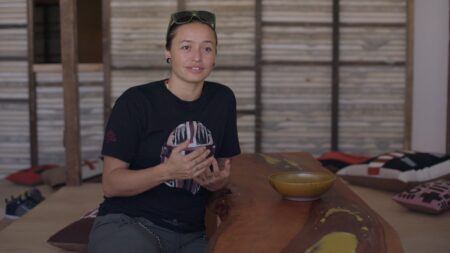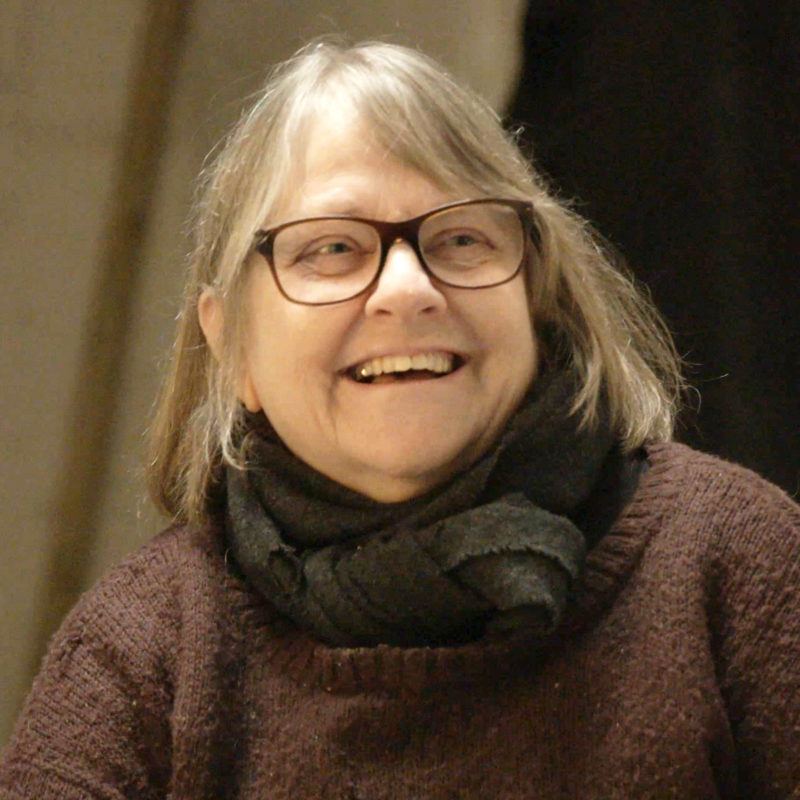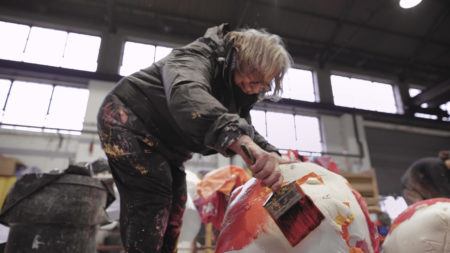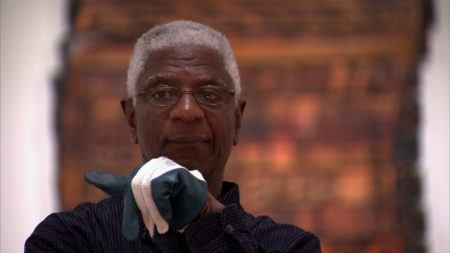Continue playing
(Time remaining: )
Play from beginning
Continue playing "{{ controller.videos[controller.getVideo(controller.currentVideo)].segmentParentTitle}}"
{{controller.videos[controller.getVideo(controller.currentVideo)].title}} has ended.
HomemadePhyllida Barlow
One of four new films from Art21’s summer 2021 programming
Sculptor Phyllida Barlow discusses her idiosyncratic approach to making art, learning and teaching, and building a career as an artist. From her home studio in London, Barlow recalls her childhood, where she witnessed her mother’s ad-hoc way of making clothing and toys for her children. Her mother treated the materials of everyday domestic life as resources with endless potential, an attitude that has affected Barlow’s artmaking. Shown at an exhibition at Haus der Kunst in Munich, Germany, Barlow’s anti-monumental, yet enormous tilting and teetering sculptures are composed of nontraditional materials like cardboard, plywood, and colorful fabric.
As an art student in London in the 1960s, Barlow struggled with the techniques, processes, and forms that were expected of sculpture. “All sorts of things were taboo, like domesticity or certain crafts that were perhaps more associated with women,” says the artist. “It was the big, heavy traditions of sculpture that were important to learn and I wasn’t that good at them.” However, this experience later informed Barlow’s approach as a teacher, where she encouraged students to develop practices that unraveled their personalities, aspirations, and desires rather than following a particular tradition.
For Barlow, art and artists exist regardless of whether they are seen by an audience. “There are plenty of artists who don’t have exhibitions, there’s plenty of art that’s never seen,” states Barlow. “Many artists endure that for their entire lives and it’s heroic.” Intrigued by the unseen and the unknown, Barlow affirms her belief in “the creative act as a deeply private experience.”
This film is among a collection that comprise Art21’s participation in the multi-institutional Feminist Art Coalition initiative. Feminist Art Coalition (FAC) is a platform for art projects informed by feminisms, fostering collaborations between arts institutions that aim to make public their commitment to social justice and structural change.
More information and creditsCredits
Series Producer: Ian Forster. Director: Ian Forster. Editor: Drigan Lee. Camera: Andrew Kemp and Anne Misselwitz. Sound: Sean Millar. Assistant Camera: Clemens Rosenow and Charlie Stoddart. Colorist: Jonah Greenstein. Sound Mix: Adam Boese. Music: Joel Pickard. Artwork Courtesy: Phyllida Barlow, Haus der Kunst, and Hauser & Wirth. Archival Images: Phyllida Barlow and Fabian Peake. Special Thanks: Elena Heitsch, Damian Lentini, and Lucy Wilkinson.
Extended Play is supported by The Andy Warhol Foundation for the Arts; and, in part, by public funds from the New York City Department of Cultural Affairs in partnership with the City Council; Dawn and Chris Fleischner; the Art21 Contemporary Council; and by individual contributors.
Closed captionsAvailable in English, German, Romanian, Italian, Japanese, Korean, Chinese, Italian
Through the Art21 Translation Project, multilingual audiences from around the globe can contribute translations, making Art21 films more accessible worldwide. Translate this video now.
Interested in showing this film in an exhibition or public screening? To license this video please visit Licensing & Reproduction.
Phyllida Barlow was born in Newcastle upon Tyne, England, in 1944. Inspired by the urban environment, Barlow’s sculptures marry unconventional materials such as cardboard, plywood, plaster, and cement with vibrantly colored paint and fabrics. Her invented forms are created through layered processes of accumulation, removal, and juxtaposition—gestures that Barlow describes as “more functional than artistic.” The resulting massive works challenge viewers’ experiences of physical space, stretching the limits of mass, volume, and height as they tower, block, and interrupt space. Yet these works remain distinctly anti-monumental; the artist leaves exposed, unfinished seams, revealing the means of the works’ making and playing with the tensions between hardness and softness, the imperious and the comic, and the painterly and the sculptural.
“Making work that does not have a destination has its loneliness and its sadness about it. Many artists endure that for their entire lives, and it’s heroic.”
Phyllida Barlow
(Un)Common materials
Jessica Stockholder



